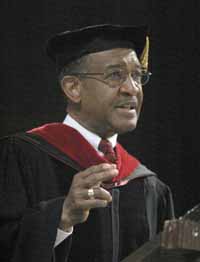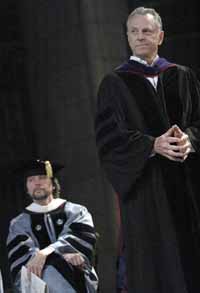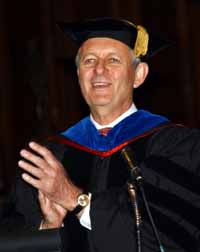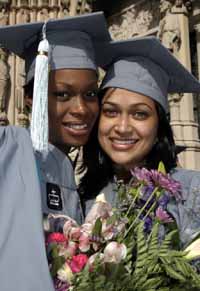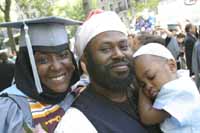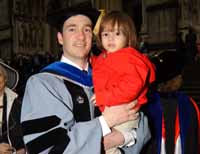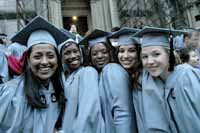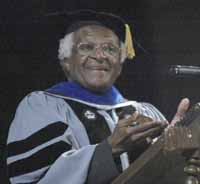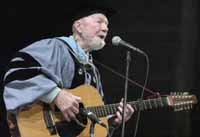Convocations Honor Supporters of Social Justice
"The gifts of our medalists are numerous and well-known. In fact, one gift that they all have in common is a selfless commitment to social justice." This was how Acting President Darlyne Bailey summed up the theme of the 2003 Master's Convocation ceremonies on May 20th at the Cathedral of St. John the Divine, adding, "Their lives are a series of intentional facts that are shaped and guided by what they love: making a significant difference in the people around them and the world at large."
Those medalists, who included Archbishop Emeritus Desmond Tutu, singer Pete Seeger, Riverside Church's Reverend James A. Forbes, Jr., filmmaker Ken Burns and civil rights attorney Morris Dees, received the Teachers College Medal for Distinguished Service at the first double-ceremony master's convocation held by the College.
While most of the medalists made speeches, the graduates at the earlier ceremony were treated to a message delivered in song by Pete Seeger. Seeger, who was honored for using his music and influence in speaking out for others and standing up for what he believes in, made brief remarks and then led the cathedral full of graduates and their families in singing, "Turn, Turn, Turn." When he was finished, he commented, "Musicians can teach the politicians that not everyone has to sing the melody."
He received a standing ovation.
The previous evening at a dinner honoring the medalists, Seeger also led the audience of faculty members and Trustees in singing, "Take It from Dr. King," and, "If I Had a Hammer."
Following Seeger at the ceremony, Forbes, often called "the preacher's preacher," told the audience that each of them has a song inside of them, which, when sung, teaches those around them. He emphasized his message in a rhythmic verse, saying, "What is the song that God has placed in your heart, if you can get your song out the world will be a different place. There is a song inside of me. I can hardly wait to see, what I have to say and the music I will play. What keeps my song from being sung? Past hurts, deep fears? What makes my freedom come so hard? A self-made, live-in prison guard."
The audience cheered his message as enthusiastically as he delivered it.
Assistant Professor Greg Anderson introduced the soft-spoken Archbishop Emeritus Desmond Tutu. In his introduction, Anderson added a personal comment that his family was from South Africa. He realized, he said, that "often, the most important life lessons are passed from generation to generation. We would be remiss if we failed to acknowledge that social justice must never be taken for granted."
Archbishop Tutu, small in stature but possessing a large presence, spoke of his own education which took place in "dilapidated, run-down buildings." Yet his teachers filled their students with exhilaration and the sense that the sky is the limit, that "what injustice and oppression and racism was saying about us were just lies."
He told the graduates that "each one of us is a masterpiece in the making," adding, "And you and you and you and you are going to be those who help God make those kids who are touched by you to know that they are masterpieces in the making and that God has not finished with them."
Later that evening, medalists Ken Burns and Morris Dees were the honored speakers at a second master's convocation.
Burns, in his remarks to the graduates told a story about interviewing Arthur Miller for Burns' first documentary film about the Brooklyn Bridge. Miller commented on the bridge's design saying, "It makes you think that maybe you, too, could do something that could last and be beautiful." Burns said that it was the last word of his first film, and he took it on as his own set of values. He then told the graduates that they, too, would do something that will last and be beautiful.
Dees, who was honored for his work as a prominent civil rights attorney who has fought legal battles against hate groups on behalf of their victims, said in his remarks, "The ultimate victory will be when America returns to its core values of fairness and justice in human rights. We cannot expect the world to follow us unless we practice here at home what we preach abroad."
Two graduating former Peace Corps volunteers were chosen to speak at each ceremony-Elizabeth Evans was the student speaker at the earlier convocation, and Kalimah Fergus spoke at the evening ceremony.
The next day, TC doctoral graduates celebrated their hooding convocation at the Cathedral after a rainy morning commencement ceremony on the main campus of Columbia University.
As a part of the convocation, Professor Warner Burke introduced the recipient of the 2003 Cleveland E. Dodge Medal for Distinguished Service to Education, Pfizer, Inc., CEO Dr. Hank A. McKinnell. McKinnel was honored for his leadership of a company that supports education that leads to better health, the training of hundreds of physicians in South Africa, and the building of a training center in Uganda for African doctors to treat HIV-infected patients, among many other initiatives in support of education and health care. Trustee Co-Chair, William Dodge Reuckert, presented the medal to McKinnell.
In his remarks to the graduates, McKinnell spoke of the skills gap in the American workplace, which he said has serious implications for our country's businesses and society. He said, "I am personally convinced that our gaps in analytical skills are eroding our ability to function as carefully thinking citizens."
He added, "I don't have a ready answer to all this, but I do believe that we need to raise the analytical and reasoning skills of the generation to come. That will require new levels of partnership between those of you going into teaching and those of you going into business."
Acting President Bailey, in her address to the doctoral candidates, said: "This hood symbolizes all your many (and many, and many) hours of critical thinking, deep questioning, active debate, and scholarly writing. It also signifies the path you have taken to arrive at a place of leadership, a role with responsibilities that you will undertake in the many years to come."
More than 100 of the 174 graduating doctoral candidates were then presented with their doctoral hoods to the delight and cheering cries of family and friends in attendance.
Published Tuesday, Jun. 17, 2003
